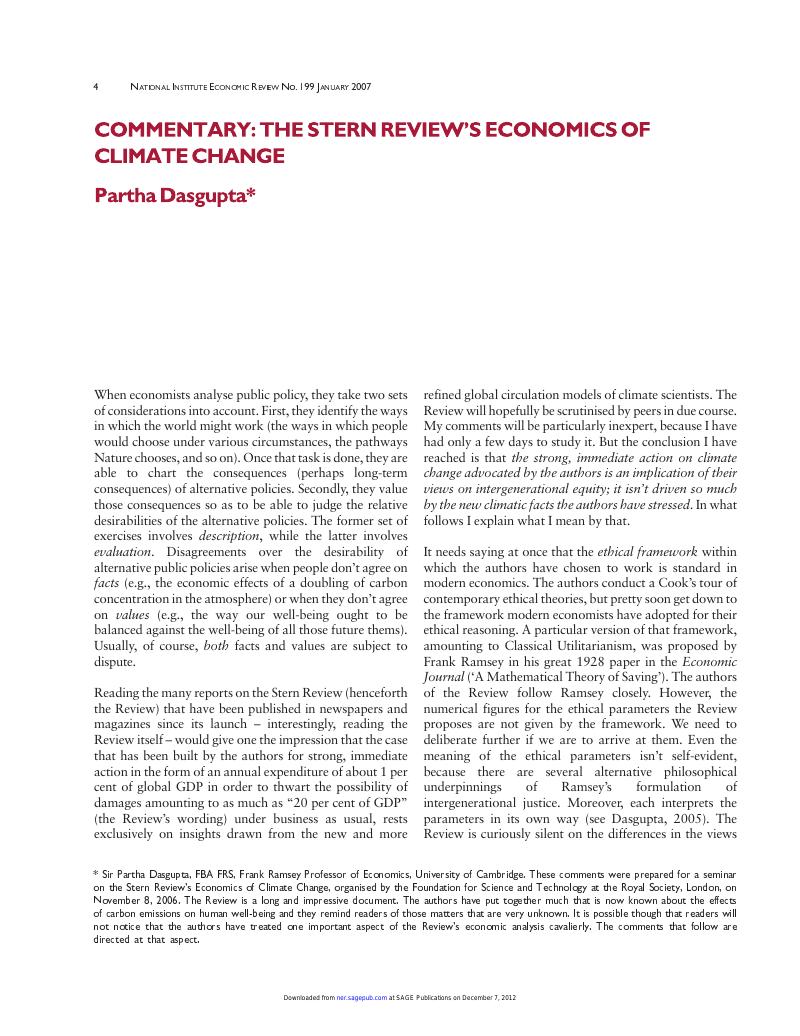Crossref Citations
This article has been cited by the following publications. This list is generated based on data provided by
Crossref.
Jensen, Paul H.
and
Webster, Elizabeth
2007.
Is Stern Correct? Does Climate Change Require Policy Intervention?.
Australian Economic Review,
Vol. 40,
Issue. 4,
p.
421.
2007.
World Economic Outlook, October 2007: Globalization and Inequality.
Nordhaus, William D
2007.
A Review of the Stern Review on the Economics of Climate Change.
Journal of Economic Literature,
Vol. 45,
Issue. 3,
p.
686.
Neumayer, Eric
2007.
A missed opportunity: The Stern Review on climate change fails to tackle the issue of non-substitutable loss of natural capital.
Global Environmental Change,
Vol. 17,
Issue. 3-4,
p.
297.
Fitoussi, Jean-Paul
Laurent, Éloi
and
Le Cacheux, Jacques
2007.
La stratégie environnementale de l'Union européenne.
Revue de l'OFCE,
Vol. n° 102,
Issue. 3,
p.
381.
Weitzman, Martin L
2007.
A Review of the Stern Review on the Economics of Climate Change.
Journal of Economic Literature,
Vol. 45,
Issue. 3,
p.
703.
Klaus, Václav
and
Tříska, Dušan
2007.
Towards a critique of the concepts of solidarity and discrimination as applied in inter-temporal analyses of the so-called global problems.
Politická ekonomie,
Vol. 55,
Issue. 6,
p.
723.
Barker, Terry
2008.
The economics of avoiding dangerous climate change. An editorial essay on The Stern Review.
Climatic Change,
Vol. 89,
Issue. 3-4,
p.
173.
Pollitt, Michael G.
2008.
The Future of Electricity (and Gas) Regulation in a Low-carbon Policy World.
The Energy Journal,
Vol. 29,
Issue. 2_suppl,
p.
63.
Quiggin, John
2008.
Stern and his critics on discounting and climate change: an editorial essay.
Climatic Change,
Vol. 89,
Issue. 3-4,
p.
195.
Tol, Richard S.J.
2008.
The Social Cost of Carbon: Trends, Outliers and Catastrophes.
Economics,
Vol. 2,
Issue. 1,
Godard, Olivier
2008.
Climate modelling for policy-making: how to represent freedom of choice and concern for future generations?.
Interdisciplinary Science Reviews,
Vol. 33,
Issue. 1,
p.
51.
Yohe, Gary W.
and
Tol, Richard S. J.
2008.
The Stern Review and the economics of climate change: an editorial essay.
Climatic Change,
Vol. 89,
Issue. 3-4,
p.
231.
2008.
World Economic Outlook, April 2008: Housing and the Business Cycle.
Dasgupta, Partha
2008.
Discounting climate change.
Journal of Risk and Uncertainty,
Vol. 37,
Issue. 2-3,
p.
141.
Paqué, Karl-Heinz
2008.
Transformation in der Ökonomie.
p.
269.
Atkinson, Giles
and
Mourato, Susana
2008.
Environmental Cost-Benefit Analysis.
Annual Review of Environment and Resources,
Vol. 33,
Issue. 1,
p.
317.
Stern, Nicholas
2008.
The Economics of Climate Change.
American Economic Review,
Vol. 98,
Issue. 2,
p.
1.
Weyant, John P.
2008.
A Critique of theStern Review's Mitigation Cost Analyses and Integrated Assessment.
Review of Environmental Economics and Policy,
Vol. 2,
Issue. 1,
p.
77.
Fujii, Tomoki
and
Karp, Larry
2008.
Numerical analysis of non-constant pure rate of time preference: A model of climate policy.
Journal of Environmental Economics and Management,
Vol. 56,
Issue. 1,
p.
83.
